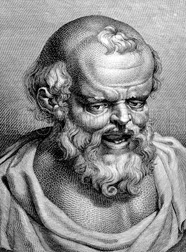Coming to grips with atomism
 Unlike Eastern philosophers such as the Buddha in India, Confucius
and Mozi in China, Western philosophers probed the universe and how it
came into being. In the 5th century BCE, two Greek philosophers who came
from Abderra suggested that everything was made up of tiny particles.
The two philosophers - Democritus and Leucippus - called the tiny
particles ‘atoms.’ The Greek word ‘atamos’ means ‘uncuttable.’ This is
considered the first atomic theory in the Western world. Unlike Eastern philosophers such as the Buddha in India, Confucius
and Mozi in China, Western philosophers probed the universe and how it
came into being. In the 5th century BCE, two Greek philosophers who came
from Abderra suggested that everything was made up of tiny particles.
The two philosophers - Democritus and Leucippus - called the tiny
particles ‘atoms.’ The Greek word ‘atamos’ means ‘uncuttable.’ This is
considered the first atomic theory in the Western world.
The two philosophers claimed that atoms moved around freely in the
empty space which separates them. In the process of movement the atoms
sometimes collide with each other. The collision leads to the formation
of new arrangements of atoms. They said the universe is full of an
infinite number of atoms. While in motion atoms can form into different
combinations which are finite. Accordingly, there are many different
substances that exist in the world.
Even the human body is made up of a large number of atoms. According
to the two philosophers the atoms do not disappear when a man dies.
Instead the atoms disperse only to be reunited in a different form. The
theory that evolved came to be known as atomism. This was the first
complete mechanistic view of the universe. In this respect, they did not
refer to any god who can be credited with the creation of the universe.
Originator
Leucippus is credited with being the originator of atomism.
Democritus developed the theory further. The Roman poet Lucretius’s
great poem De Rerum Natura popularised atomism propounded by Leucippus
and Democritus. Today most of us know that atoms are minute material
particles. They are the ultimate material constituents of all things.
|

Man is a microcosm of the universe
- Democritus (c.460-371 BCE) |
Democritus said atoms have certain properties such as size, shape,
position and motion. However, atoms have no colour, taste, temperature
or smell. Combinations of atoms grow large enough for us to see. Massive
mountains, trees, rivers and even humans are such composites of atoms.
According to Democritus, atoms are so small that they cannot be
destroyed. In other words, atoms are eternal. He said empty space
separates atoms. He called the empty space or the void “no-things.”
However, “no-things” does not mean “nothing.” An empty space is
“something”.
Explanation
Democritus gives a plausible explanation of everything found in the
universe. According to him, things come into existence when atoms
combine in a certain pattern. The pattern will decide on the size,
lifespan and everything else of the thing that comes into being. If we
apply this theory to the lifespan of humans, animals and mountains, it
becomes very clear why each “thing” exists for a limited number of
years. However, nothing exists forever in the original state. Similarly,
everything changes from moment to moment. This is the crux of Buddhism
as well.
Then why does a man live only for less than 100 years while a
mountain may exist for thousands of years? This is because of the
composition of highly compatible atoms and less stable ones. For
instance, a huge rock such as Sigiriya will exist for more than a
millennium, but a cat will live only for a few years. Democritus said
the life span of man or anything else is not decided by an all powerful
god but the eternal swirling of atoms.
Law of motion
Christians believe that God created the universe and everything else
in it for a certain purpose. He also had an elaborate plan to do so.
However, Democritus said there is no intentional order or purpose in the
universe. According to him, nothing occurs at random. The law of motion
relating to atoms explains everything. He believed that we could observe
the atomistic behaviour and predict future events.
Instead of rejecting Democritus’s atomic theory, modern philosophers
and scientists have modified it giving new connotations. Democritus was
one of the early philosophers who believed in cause and effect theory.
He said every event in the universe is causally determined by preceding
events. Today we come across a more sophisticated version of atomism
known as “determinism” which is vigorously defended and denied by modern
philosophers. |

